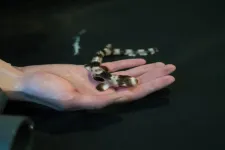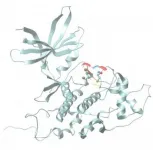INFORMATION:
Strategy tested in mice protects against SARS-CoV-2 & coronaviruses that represent human threats
2021-01-12
(Press-News.org) An immunization strategy tested in mice protects against infection from SARS-CoV-2, as well as from potentially emerging animal coronaviruses, researchers say. The approach could be "used as described or easily adapted" to provide defense against newly discovered zoonotic coronaviruses. In the last 20 years, three betacoronaviruses have caused devastating disease in humans. The global pandemic caused by the latest such virus, SARS-CoV-2, highlights the need to protect against other strains that could present a threat to humans, possibly through a pan-coronavirus vaccine. To support related efforts, Alexander A. Cohen and colleagues used a "plug and display" approach to make a series of nanoparticles displaying the receptor-binding domain (RBD) of either SARS-CoV-2 alone ("homotypic nanoparticles") or the SARS-CoV-2 RBD along with a diverse set of RBDs from bat and pangolin betacoronaviruses that represent threats to humans ("mosaic nanoparticles"). In studies in mice, immunization with mosaic nanoparticles did not reduce immune response compared with immunization by a homotypic nanoparticle. What's more, mosaic nanoparticles generated cross-reactive immune responses in mice after one injection, whereas such responses required prime and boost injections in the case of the homotypic particle. The mosaic nanoparticles also elicited antibodies that, beyond recognizing the strains displayed, recognized mismatched strains, the authors say. Studying IgG antibodies from COVID-19 plasma donors, Cohen et al. found they exhibited little to no recognition of coronaviruses other than SARS-CoV-2, suggesting SARS-CoV-2-infection-induced immunity in humans would be unlikely to be protective against an outbreak of a new zoonotic coronavirus. This is yet another indication of the need to develop a vaccine to protect against emerging coronaviruses, they say. The results suggest mosaic nanoparticles as a candidate vaccine to protect against COVID-19 and other emerging coronaviruses with human spillover potential, write Cohen and team.
ELSE PRESS RELEASES FROM THIS DATE:
New taxonomy of non-skeletal rare disorders with impact on bone
2021-01-12
Thanks to major progress in the understanding and management of rare congenital diseases and syndromes, many patients with these rare disorders are now living longer lives. With this progress it has become apparent that many non-skeletal rare diseases have an impact on bone mass, bone quality and/or bone metabolism, with potentially severe repercussions for quality of life in adults.
The new paper 'Bone fragility in patients affected by congenital diseases non skeletal in origin', published in Orphanet Journal of Rare Diseases by the International Osteoporosis Foundation (IOF) Skeletal Rare Diseases Working Group (SRDWG), provides ...
Turbulent dynamics in the human brain could revolutionize the understanding of its functionality
2021-01-12
Most people experience turbulence primarily from the experience of flying in an airplane. However, turbulence is a key feature of nature and is found everywhere, from rivers to galaxies.
Turbulent-like dynamics are difficult to capture in a still image. However, Leonardo da Vinci did everything possible to identify the underlying order of the phenomenon, which he observed in eddy currents forming randomly in water. In fact, he was fascinated by trying to understand and describe the generating principles governing such complicated dynamics. This is so much ...
Artificial intelligence puts focus on the life of insects
2021-01-12
Scientists are combining artificial intelligence and advanced computer technology with biological know how to identify insects with supernatural speed. This opens up new possibilities for describing unknown species and for tracking the life of insects across space and time
Insects are the most diverse group of animals on Earth and only a small fraction of these have been found and formally described. In fact, there are so many species that discovering all of them in the near future is unlikely.
This enormous diversity among insects also means that they have very different life histories and roles in the ecosystems.
For ...
Study finds future too warm for baby sharks
2021-01-12
A new study conducted at the New England Aquarium finds that as climate change causes the ocean to warm, baby sharks are born smaller, exhausted, undernourished, and into environments that are already difficult for them to survive in.
In a recently published paper in the journal Scientific Reports, lead author Carolyn Wheeler, a Ph.D. candidate at the University of Massachusetts Boston and at the ARC Centre of Excellence for Coral Reef Studies at James Cook University, examined the effects of increased temperatures on the growth, development and physiological performance of epaulette ...
Museum scientists: Prepare for next pandemic now by preserving animal specimens in natural history
2021-01-12
It's been more than a year since the first cases were identified in China, yet the exact origins of the COVID-19 pandemic remain a mystery. Though strong evidence suggests that the responsible coronavirus originated in bats, how and when it crossed from wildlife into humans is unknown.
In a study published online Jan.12 in the journal mBio, an international team of 15 biologists say this lack of clarity has exposed a glaring weakness in the current approach to pandemic surveillance and response worldwide.
In most recent studies of animal-borne pathogens with the potential to spread to humans, known as zoonotic pathogens, physical specimens of suspected wildlife ...
New technology reveals fast and slow twitch muscle fibers respond differently to exercise
2021-01-12
Exercising regularly is one of the best defences against metabolic diseases, such as obesity and diabetes - but why? It's a question that scientists are still struggling to answer. While exercising changes the molecular behaviour of muscles, it's not well understood how these molecular changes improve metabolic health.
Scientists at the University of Copenhagen have now developed a new technology that allows researchers to study muscle biology on a more detailed level - and hopefully find some new answers. They extracted 'fast' and 'slow' twitch muscle fibers from freeze-dried muscle samples that were taken before and after 12 weeks of cycling exercise training. Their comprehensive analysis of the protein expression of the fibers provides new evidence that the ...
Hospitals must help their own COVID long-haulers recover, experts argue
2021-01-12
BOSTON -- By mid-November, the Centers for Disease Control and Prevention had reported that 218,439 health care workers in the U.S. had been infected with COVID-19 -- a likely underestimate due to incomplete data from states. About 3% to 4% of health care personnel who recover from coronavirus infection are expected to become "COVID long-haulers" as they cope with debilitating symptoms 12 to 18 months after the acute stage of the infection clears.
"As COVID-19 surges again, hospitals are facing a shortage of skilled frontline providers who can meet the relentless demands of caring for these patients," says Zeina N. Chemali, MD, MPH, a psychiatrist and neurologist at Massachusetts ...
Scientists have synthesized an unusual superconducting barium superhydride
2021-01-12
A group of scientists from Russia, China, and the United States predicted and then experimentally obtained barium superhydrides' new unusual superconductors. The study was published in Nature Communications.
Chemists and physicists have been hunting down room-temperature superconductors since the first half of the 20th century. Initially, high hopes were placed on metallic hydrogen, but solid metallic hydrogen can become superconducting only at extremely high pressures of several million atmospheres, as it later transpired. Chemists then tried adding other elements to hydrogen in the hope of attaining superconductivity by stabilizing the metallic state under less challenging conditions. ...
Rotten egg gas could guard against Alzheimer's disease
2021-01-12
Typically characterized as poisonous, corrosive and smelling of rotten eggs, hydrogen sulfide's reputation may soon get a face-lift thanks to Johns Hopkins Medicine researchers. In experiments in mice, researchers have shown the foul-smelling gas may help protect aging brain cells against Alzheimer's disease. The discovery of the biochemical reactions that make this possible opens doors to the development of new drugs to combat neurodegenerative disease.
The findings from the study are reported in the Jan. 11 issue of the Proceedings of the National Academies of Sciences.
"Our new data firmly link aging, neurodegeneration and cell signaling using hydrogen sulfide and other gaseous molecules within the cell," says Bindu Paul, M.Sc., Ph.D., faculty ...
A bucket of water can reveal climate change impacts on marine life in the Arctic
2021-01-12
Climate changes prompt many important questions. Not least how it affects animals and plants: Do they adapts, gradually migrate to different areas or become extinct? And what is the role played by human activities? This applies not least to Greenland and the rest of the Artic, which are expected to see the greatest effects of climate changes.
'We know surprisingly little about marine species and ecosystems in the Arctic, as it is often costly and difficult to do fieldwork and monitor the biodiversity in this area', says Associate Professor of marine mammals and instigator of the study ...




